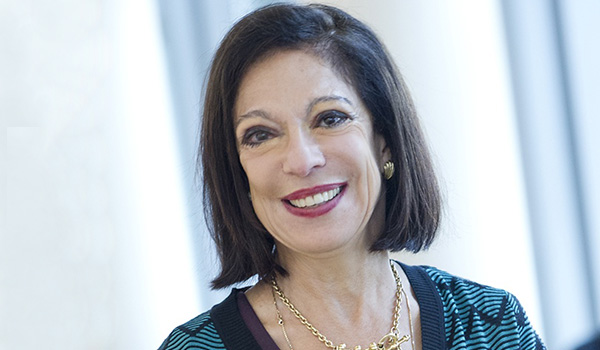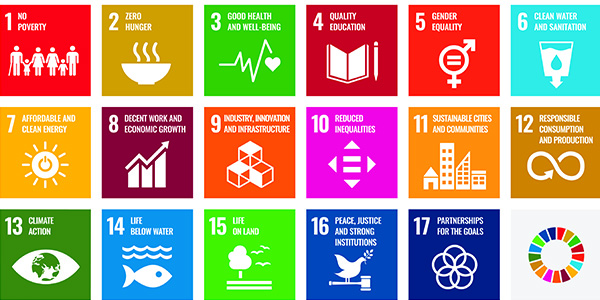Solving Climate | Humanistic Perspectives from MIT
Can the world change course on climate?
Political scientist Nazli Choucri discusses challenges and hopes for global coordination on climate issues — and the role of political science in the process.

Nazli Choucri, MIT Professor of Political Science; photo by Stuart Darsch
"Coordination and cooperation across the jurisdictions of sovereign states is foundational for any response to climate change impacts....As we work to change course, new norms will be developed, and political science provides important perspectives on how to establish such norms. For example, having learned to recognize the burdens of inequity, we can establish the value of equity as foundational for our social order."
Series: Solving Cimate | Humanistic Perspectives from MIT
In this ongoing series, MIT faculty, students, and alumni in the humanistic fields share perspectives that are significant for solving climate change and mitigating its myriad social and ecological impacts. Nazli Choucri is a professor of political science with expertise on climate, sustainability, international relations, and cyberpolitics. She is the architect and director of the Global System for Sustainable Development, an evolving knowledge networking system centered on sustainability problems and solution strategies. The author and/or editor of 12 books, she is also the founding editor of the MIT Press book series Global Environmental Accord: Strategies for Sustainability and Institutional Innovation. MIT SHASS Communications spoke with Professor Choucri this fall, soon after the 2021 UN Climate Change Conference (COP26).
____
Q: The impacts of climate change — including storms, floods, wildfires, and droughts — have the potential to destabilize nations, yet they are not constrained by borders. What international developments most concern you in terms of addressing climate change and its myriad ecological and social impacts?
Climate change is a global issue. By definition, and a long history of practice, countries focus on their own priorities and challenges. Over time, we have seen the gradual development of norms reflecting shared interests, and the institutional arrangements to support and pursue the global good. What concerns me most is that general responses to the climate crisis are being framed in broad terms; the overall pace of change remains perilously slow; and uncertainty remains about operational action and implementation of stated intent. We have just seen the completion of the 26th meeting of states devoted to climate change, the United Nations Climate Change Conference (COP26). In some ways this is positive. Yet, past commitments remain unfulfilled, creating added stress in an already stressful political situation.
Industrial countries are uneven in their recognition of, and responses to, climate change. This may signal uncertainty about whether climate matters are sufficiently compelling to call for immediate action. Alternatively, the push for changing course may seem too costly at a time when other imperatives — such as employment, economic growth, or protecting borders — inevitably dominate discourse and decisions. Whatever the cause, the result has been an unwillingness to take strong action. Unfortunately, climate change remains within the domain of “low politics,” although there are signs the issue is making a slow but steady shift to “high politics” — those issues deemed vital to the existence of the state. This means that short-term priorities, such as those noted above, continue to shape national politics and international positions and, by extension, to obscure the existential threat revealed by scientific evidence.

"Industrial countries are uneven in their recognition of, and responses to, climate change...Whatever the cause, the result has been an unwillingness to take strong action. Climate change remains within the domain of 'low politics,' although there are signs the issue is making a slow but steady shift to 'high politics' — those issues deemed vital to the existence of the state."
As for developing countries, these are overwhelmed by internal challenges, and managing the difficulties of daily life always takes priority over other challenges, however compelling. Long-term thinking is a luxury, but daily bread is a necessity. Non-state actors — including registered nongovernmental organizations, climate organizations, sustainability support groups, activists of various sorts, and in some cases much of civil society — have been left with a large share of the responsibility for educating and convincing diverse constituencies of the consequences of inaction on climate change. But many of these institutions carry their own burdens and struggle to manage current pressures.
The international community, through its formal and informal institutions, continues to articulate the perils of climate change and to search for a powerful consensus that can prove effective both in form and in function. The general contours are agreed upon — more or less. But leadership of, for, and by the global collective is elusive and difficult to shape. Most concerning of all is the clear reluctance to address head-on the challenge of planning for changes that we know will occur. The reality that we are all being affected — in different ways and to different degrees — has yet to be sufficiently appreciated by everyone, everywhere. Yet, in many parts of the world, major shifts in climate will create pressures on human settlements, spur forced migrations, or generate social dislocations. Some small island states, for example, may not survive a sea-level surge. Everywhere there is a need to cut emissions, and this means adaptation and/or major changes in economic activity and in lifestyle.
The discourse and debate at COP26 reflect all of such persistent features in the international system. So far, the largest achievements center on the common consensus that more must be done to prevent the rise in temperature from creating a global catastrophe. This is not enough, however. Differences remain, and countries have yet to specify what cuts in emissions they are willing to make.
Echoes of who is responsible for what remains strong. The thorny matter of the unfulfilled pledge of $100 billion once promised by rich countries to help countries to reduce their emissions remained unresolved.
At the same time, however, some important agreements were reached. The United States and China announced they would make greater efforts to cut methane, a powerful greenhouse gas. More than 100 countries agreed to end deforestation. India joined the countries committed to attain zero emissions by 2070. And on matters of finance, countries agreed to a two-year plan to determine how to meet the needs of the most vulnerable countries.

"Only recently have alternatives begun to be considered to the traditional economic growth model based on industrialization and high levels of energy use. To make changes, we must first understand the incentives, realities, and choices that shape dysfunctional behaviors and outcomes. We can then consider the many ways in which our known 'normal' can be adjusted."
Q: In what ways do you think the tools and insights from political science can advance efforts to address climate change and its impacts?
I prefer to take a multidisciplinary view of the issues at hand, rather than focus on the tools of political science alone. Disciplinary perspectives can create siloed views and positions that undermine any overall drive toward consensus. The scientific evidence is pointing to, even anticipating, pervasive changes that transcend known and established parameters of social order all across the globe.
That said, political science provides important insight, even guidance, for addressing the impacts of climate change in some notable ways. One is understanding the extent to which our formal institutions enable discussion, debate, and decisions about the directions we can take collectively to adapt, adjust, or even depart from the established practices of managing social order.
If we consider politics as the allocation of values in terms of who gets what, when, and how, then it becomes clear that the current allocation requires a change in course. Coordination and cooperation across the jurisdictions of sovereign states is foundational for any response to climate change impacts.
We have already recognized, and to some extent, developed targets for reducing carbon emissions — a central impact from traditional forms of energy use — and are making notable efforts to shift toward alternatives. This move is an easy one compared to all the work that needs to be done to address climate change. But, in taking this step we have learned quite a bit that might help in creating a necessary consensus for cross-jurisdiction coordination and response.
Respecting individuals and protecting life is increasingly recognized as a global value — at least in principle. As we work to change course, new norms will be developed, and political science provides important perspectives on how to establish such norms. We will be faced with demands for institutional design, and these will need to embody our guiding values. For example, having learned to recognize the burdens of inequity, we can establish the value of equity as foundational for our social order both now and as we recognize and address the impacts of climate change.

The 17 UN Sustainability Goals
"The goal of 17.181, my class on sustainability is to frame as clearly as possible the concept of sustainable development with attention to conceptual, empirical, institutional, and policy issues. Overall, sustainable development refers to the process of meeting the needs of current and future generations, without undermining the resilience of the life-supporting properties, the integrity of social systems, or the supports of the human-constructed cyberspace."
Q: You teach a class on Sustainability Development: Theory and Practice. Broadly speaking, what are goals of this class? What lessons do you hope students will carry with them into the future?
The goal of 17.181, my class on sustainability, is to frame as clearly as possible the concept of sustainable development (sustainability) with attention to conceptual, empirical, institutional, and policy issues.
The course centers on human activities. Individuals are embedded in complex interactive systems: the social system, the natural environment, and the constructed cyber domain — each with distinct temporal, special, and dynamic features. Sustainability issues intersect with, but cannot be folded into, the impacts of climate change. Sustainability places human beings in social systems at the core of what must be done to respect the imperatives of a highly complex natural environment.
We consider sustainability an evolving knowledge domain with attendant policy implications. It is driven by events on the ground, not by revolution in academic or theoretical concerns per se. Overall, sustainable development refers to the process of meeting the needs of current and future generations, without undermining the resilience of the life-supporting properties, the integrity of social systems, or the supports of the human-constructed cyberspace.
More specifically, we differentiate among four fundamental dimensions and their necessary conditions:
(a) ecological systems — exhibiting balance and resilience;
(b) economic production and consumption — with equity and efficiency;
(c) governance and politics — with participation and responsiveness; and
(d) institutional performance — demonstrating adaptation and incorporating feedback.
The core proposition is this: If all conditions hold, then the system is (or can be) sustainable. Then, we must examine the critical drivers — people, resources, technology, and their interactions — followed by a review and assessment of evolving policy responses. Then we ask: What are new opportunities?
I would like students to carry forward these ideas and issues: What has been deemed “normal” in modern Western societies and in developing societies seeking to emulate the Western model is damaging humans in many ways — all well known. Yet only recently have alternatives begun to be considered to the traditional economic growth model based on industrialization and high levels of energy use. To make changes, we must first understand the underlying incentives, realities, and choices that shape a whole set of dysfunctional behaviors and outcomes. We then need to delve deep into the driving sources and consequences, and to consider the many ways in which our known “normal” can be adjusted — in theory and in practice.
"I see a few hopeful signs. Among them: climate change has been recognized as a global phenomenon. Major efforts have and are being made in world politics to forge action agendas with specific targets. And, however disappointing the results of COP26 might seem, the global community is moving in the right direction."
Q: In confronting an issue as formidable as global climate change, what gives you hope?
I see a few hopeful signs; among them:
The scientific evidence is clear and compelling. We are no longer discussing whether there is climate change; or if we will face major challenges of unprecedented proportions; or even how to bring about an international consensus on the salience of such threats.
Climate change has been recognized as a global phenomenon. Imperatives for cooperation are necessary. No one can go it alone. Major efforts have and are being made in world politics to forge action agendas with specific targets.
The issue appears to be on the verge of becoming one of “high politics” in the United States.
Younger generations are more sensitive to the reality that we are altering the life-supporting properties of our planet. They are generally more educated, skilled, and open to addressing such challenges than their elders.
However disappointing the results of COP26 might seem, the global community is moving in the right direction.
None of the above points, individually or jointly, translates into an effective response to the known impacts of climate change — let alone the unknown. But, this is what gives me hope.
Suggested links
Department of Political Science
MIT IDSS - MIT Institute for Data, Systems, and Society
Global System for Sustainable Development
Series: Global Environmental Accord: Strategies for Sustainability and Institutional Innovation
Class: 17.181 | Sustainable Development: Theory and Practice
Story: Choucri connects dots between technology and geopolitics
Interview prepared by MIT SHASS Communications
Editorial and Design Director: Emily Hiestand
Senior Writer: Kathryn O'Neill
Published December 2021
